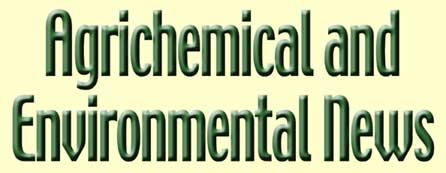

Click on the above rectangle for Portable Document Format (PDF) version of this document. The PDF version is recommended for printing. Should you not have Adobe Acrobat Reader (required to read PDF files), this free program is available for download at http://www.adobe.com/prodindex/acrobat/readstep.html
January 1, 2002
The Agrichemical and Environmental
News (AENews) is a Washington State University (WSU) Cooperative Extension
newsletter directed at educating the people of the state of Washington. Its
purpose is to disseminate timely and accurate information and factual analyses
on agrichemicals and their related environmental and human health effects.
The Washington State agricultural community and those groups and individuals interested in agricultural issues are the primary target of AENews. Authors must craft their articles to be easily understood by readers at the college level. The tone of articles should be explanatory and conversational. Authors should not assume that the audience has previous knowledge of scientific or technical terms and should refrain from using jargon. Any scientific terms necessary for the explanation of a concept should be explained thoroughly in layman’s terms. All acronyms should be spelled out and, where necessary for clarity, explained to the reader.
AENews publishes primarily invited articles, essays, and analyses. Prospective authors may submit prospective articles (preferred) or article queries to any member of the Editorial Board. Article queries should include a synopsis or abstract of the proposed article, author qualifications, and, if available, previously written material by the author. The editorial board will review the submitted material for adherence to policy. Articles and queries require a simple majority vote by the editorial board for approval. Criteria for acceptance are as follows and material must meet all criteria to be judged acceptable for publication. (1) Material must be timely and well written, keeping the target audience in mind (see above). Articles that do not fit the parameters of the target audience will be returned to authors for rewriting or will be edited. (2) Articles must exhibit factual reporting and essays/analyses must be based on relevant scientific principles. (3) No ad hominem attacks are allowed regardless of scientific basis. (4) Material must fall in the subject areas of agrichemicals and/or related environmental and/or human health issues. (5) Unless judged to have superior merit, materials already published elsewhere are not accepted for publication. (6) If inquiries arrive on material already in preparation by another author, additional materials on that subject will not be accepted unless they offer a substantially different viewpoint or add significant information. No letters to the Editor are accepted. Notices of workshops/public meeting notices will be included at the discretion of the Editor and the Editorial Board. The Editor and/or the Editorial Board reserve the right to determine timing of article publication.
The editorial board is composed of the following WSU personnel: the Pesticide Coordinator, the Food and Environmental Quality Laboratory (FEQL) Environmental Toxicologist, the Agrichemical and Environmental Education Specialist, the FEQL Analytical Chemist, and the AENews Editor.
This policy takes effect with the January 2002 issue.